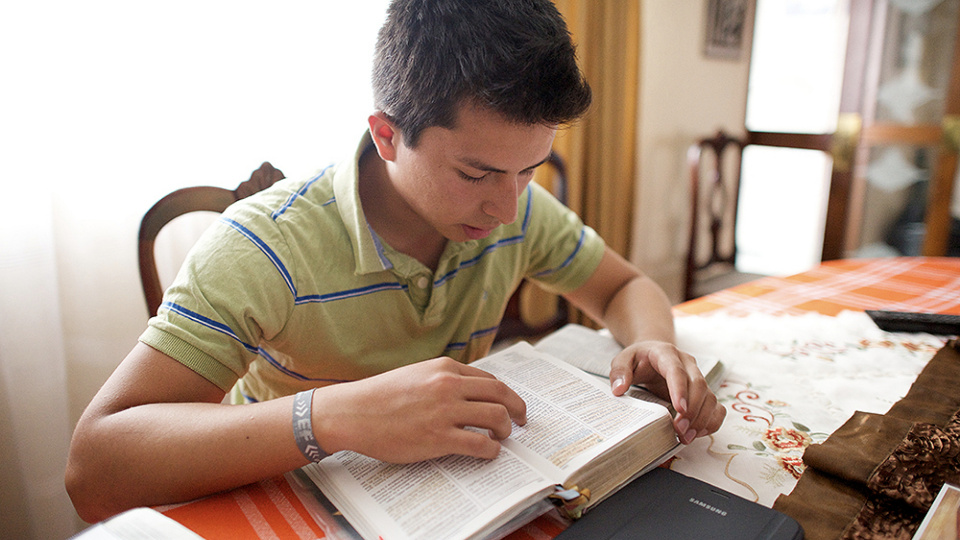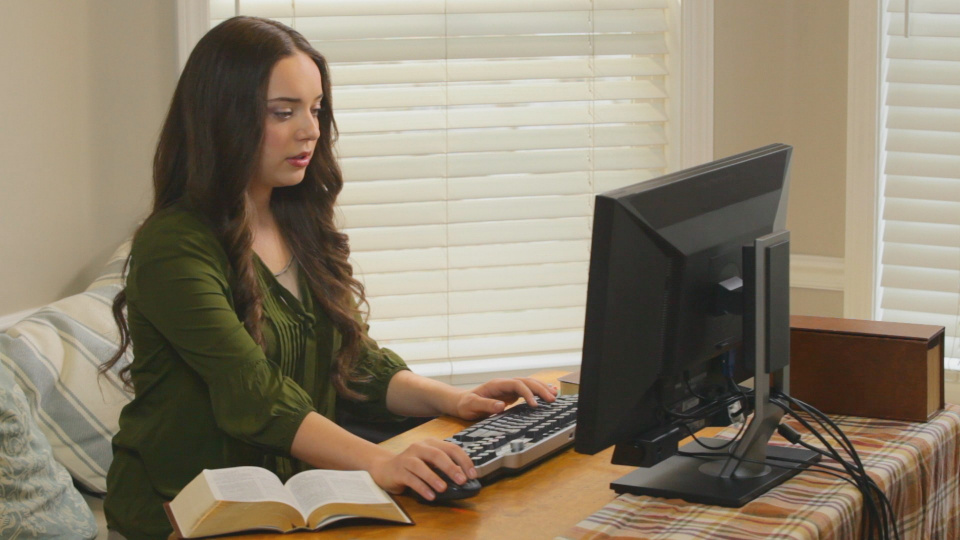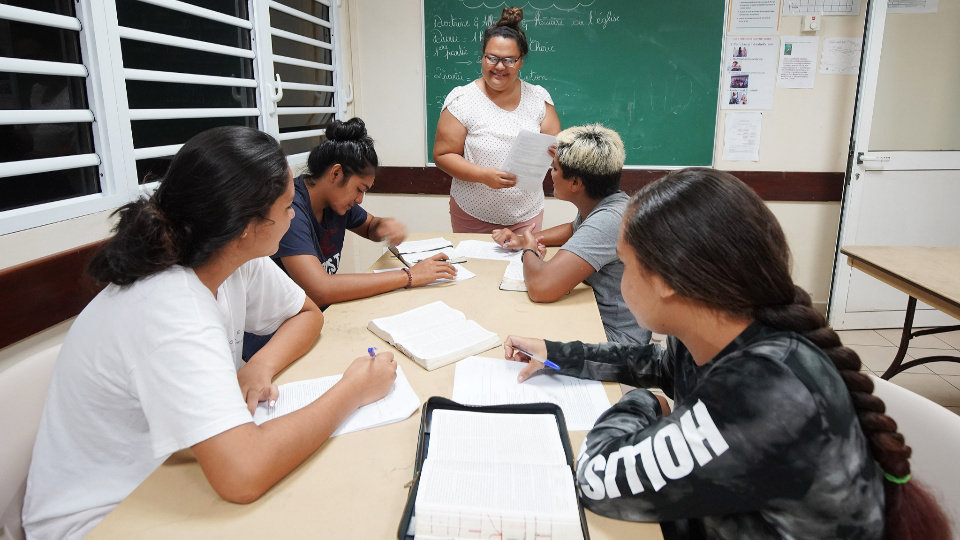
S&I pandemic
A seminary student in Ecuardor studies the scriptures at home.© 2021 by Intellectual Reserve, Inc. All rights reserved.This story appears here courtesy of TheChurchNews.com. It is not for use by other media.
By Rachel Sterzer Gibson, Church News
Last year, in a city within the Ural Mountains, a long rugged spine in west-central Russia that marks the border between Europe and Asia, a branch president and a Seminaries and Institutes coordinator invited a young man to attend an institute class.
Five years prior, the young man had a crisis of faith and decided to remove his name from the records of the Church. Claiming to be an atheist, the young man nevertheless reluctantly accepted the invitation. Through the newly expanded opportunities available online due to the pandemic, the young man participated in institute classes in Ukraine, the Baltics, Moscow and Siberia. He listened to the testimonies of other students, including new converts. Institute instructors answered questions that had been troubling him.
During April general conference, he saw an image of the Savior as the Good Shepherd cradling a lamb in His arms and realized he was the little lamb, the one that got lost. He called his branch president and the missionaries and was re-baptized on April 10, and “returned to the flock during the gathering of Israel,” related Aleksandr Drachov, Seminaries and Institutes Europe Area Director.
In many ways it’s been a tough year for Seminaries and Institutes, noted Chad H. Webb, the Church’s administrator of Seminaries and Institutes.
The spread of the coronavirus has disrupted the normal operations of schools, businesses, organizations and individuals, including Seminaries and Institutes and its teachers, employees, students and their families.
“I don’t want to minimize just how hard this has been,” Webb said. “Our teachers and our students have been amazing in their resiliency and in their efforts to learn and teach the gospel.”
And yet, even amidst the dark clouds the coronavirus threw over normal practices, there were silver linings, like the story of the young man from the Ural Mountains.
It is unlikely that his scenario “would have been possible if it were not for online classes and the pandemic,” Drachov wrote the Church News in an email. “He had the opportunity to listen to different teachers, different students and that helped him. The Lord is doing His work.”
The pandemic served as a catalyst, said Matt Langton, director of digital learning for Seminaries and Institutes. Although online learning opportunities have been in the works for several years, it hasn’t been readily promoted, especially for seminary. Online institute classes have been growing steadily over the past two years with the growth of BYU–Pathway Worldwide, which includes a religious credit requirement. However, “the pandemic was definitely an accelerator for growth, particularly in seminary,” Langton said.

S&I pandemic
A student participates in online seminary.© 2021 by Intellectual Reserve, Inc. All rights reserved.With the expansion of online seminary and institute offerings have also come expanded opportunities. “We’ve had students who have reported really great experiences,” Webb said. Some have joined the Church who would probably never have gone to a face-to-face class but were invited to join an online seminary or institute class by a friend. It was easier and less intimidating to jump onto an online Zoom class, Webb said.
Taegel Jung, the Korea Area Director, shared the experience of a non-member youth in Okinawa, Japan, Yukonori Akamine, who will soon be baptized. He studied diligently in seminary throughout the last year of the pandemic and completed 100% of the assignments. “Even when I couldn’t attend church because of the pandemic, the Lord was always with me while studying in seminary,” Akamine wrote.
Langton said that in many areas, technology has allowed students to invite their friends and acquaintances from around the world, not just from their area. “That brings an enormous diverse perspective and experiences to the table that we haven’t seen historically within certain institutes and that’s been a huge blessing to both students and teachers,” Langton said.
In Drachov’s area, Oleg is a young adult who lives in the Siberian mountains. He and his mother are the only members of the Church in their city. Banifas is a young man living in a small branch in Ivano-Frankivsk, Ukraine. In past years, they have had limited opportunities to attend institute classes. Now they have attended several classes together.
“There are many more students like these two [young men] who were blessed because of the technology and classes without boundaries,” Drachov wrote.
Still, adjusting to online teaching models has not been easy. Instructors have struggled to learn how to teach while wearing a mask or how to engage seminary students over Zoom. Others have been unable to participate in areas of the world where the internet infrastructure isn’t sufficient to sustain online classes.
Some teachers have adapted quickly and effectively to online instruction. Others have struggled, Webb noted.
During the 2021 Seminary and Institutes Annual Training Broadcast in January, Rory Bigelow, associate administrator over operations, said plainly, “Our level of proficiency in online delivery of religious education is not where it needs to be.” Instructors and administrators will need to continue to upskill, Bigelow said, and find ways to improve.
“We still have a lot to learn,” Webb said.
Langton said he hopes that the online program will continue to make seminary and institute experiences available to students “wherever they are, at any time, from anywhere.”
“We’re going to try to take the lessons from the pandemic and learn all we can to make seminary and institute more accessible, and then to make it as meaningful of an experience as we can,” Webb said. Their purpose is to provide youth and young adults with experiences that deepen their conversion. It’s about providing experiences that are relevant to their lives, meeting their needs and answering their questions, he said.
The hope is that whether it’s delivered face to face or online, “that we’re able to create a sense of belonging for them. That young people who attend can feel a part of what’s going on and that they belong,” Webb said.

SI-pandemic
Roopinia Hilowea teaches Latter-day Saint seminary in Bora Bora on May 28, 2019. Photo by Jeffrey D. Allred, courtesy of Church News.Copyright 2021 Deseret News Publishing CompanyCopyright 2021 Deseret News Publishing Company